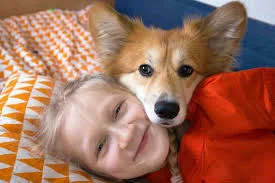Corgis have captured the hearts of dog lovers around the world with their short legs, long bodies, and expressive faces. But there's much more to these pint-sized pups than meets the eye. In this blog post, we'll dive into the world of corgis, exploring their origins, temperament, how they stack up against other breeds, and some tips on training these intelligent and affectionate dogs.
What Exactly is a Corgi?
The term "corgi" actually refers to two distinct breeds: the Pembroke Welsh Corgi and the Cardigan Welsh Corgi. Both breeds originated in Wales and were used as herding dogs, adept at driving cattle by nipping at their heels. Their low stature allowed them to avoid kicks from cattle, making them excellent herding companions.
Pembroke Welsh Corgi
The Pembroke Welsh Corgi is perhaps the more famous of the two, partly due to Queen Elizabeth II's fondness for the breed. Pembrokes are known for their outgoing and friendly nature, their lack of a tail (or a very short one), and their slightly smaller size compared to the Cardigan.
Cardigan Welsh Corgi
The Cardigan Welsh Corgi is older than the Pembroke and is distinguished by its long tail and larger, more rounded ears. Cardigans are also known for being affectionate and loyal, with a more reserved demeanor compared to their Pembroke cousins.
The Corgi Temperament
Corgis are known for their bold and friendly personalities. They are active and intelligent dogs, which means they need regular mental and physical stimulation. Despite their size, they have a big-dog bark and are often alert and aware of their surroundings, making them excellent watchdogs.
Corgis are also known for their strong herding instincts, which can manifest as a tendency to herd children or other pets. Early socialization and training can help manage this behavior.
Comparing Corgis to Other Breeds
When compared to other breeds, corgis are:
Training Your Corgi
Training a corgi can be a delightful experience due to their quick wit and desire to please. Here are some tips for training your corgi:
- More active than many small breeds: Their herding background gives them plenty of energy.
- More trainable than some breeds: Their intelligence and eagerness to please make them relatively easy to train.
- Sturdier than they look: Despite their short stature, they are strong and athletic.
- Prone to certain health issues: Like many purebred dogs, they can be susceptible to specific health problems, such as hip dysplasia and degenerative myelopathy.
Training Your Corgi
Training a corgi can be a delightful experience due to their quick wit and desire to please. Here are some tips for training your corgi:
Start Early
Begin training and socialization as soon as you bring your corgi home. Early exposure to different people, pets, and environments will help your corgi grow into a well-adjusted adult.
Use Positive Reinforcement
Corgis respond well to positive training methods. Use treats, praise, and play as rewards for good behavior.
Keep Training Sessions Short and Fun
Their attention spans can be short, and they can become bored with repetitive tasks. Keep training sessions brief and engaging to maintain their interest.
Be Consistent
Consistency is key in training any dog. Make sure everyone in the household is on the same page with commands and rules.
Address Herding Behavior
If your corgi tries to herd people or animals, redirect this behavior by engaging them in other activities like fetch or agility training.
Exercise is Crucial
A tired corgi is a well-behaved corgi. Ensure they get plenty of exercises to burn off energy and reduce the likelihood of mischief.
Caring for Your Corgi
Corgis have a thick double coat that sheds year-round and more heavily during the change of seasons. Regular brushing can help manage the shedding. They also require a balanced diet and regular exercise to maintain a healthy weight, as their long backs can lead to issues if they become overweight.
Corgis are more than just a cute face; they are active, intelligent, and loyal companions that can fit well into various lifestyles. Whether you're looking for a family pet, a vigilant watchdog, or a herding dog, the corgi might just be the perfect breed for you. With the right training and care, a corgi can be a delightful addition to your family for years to come.







